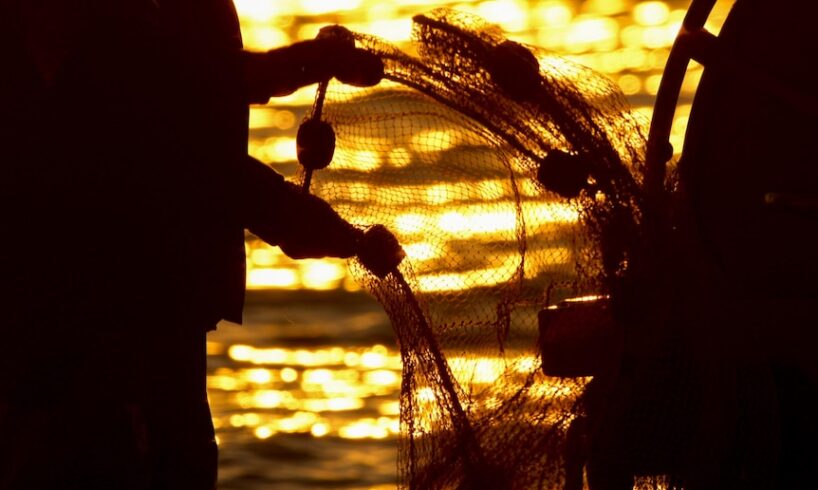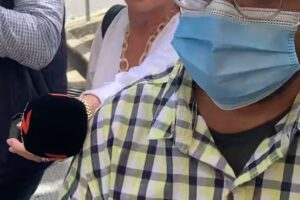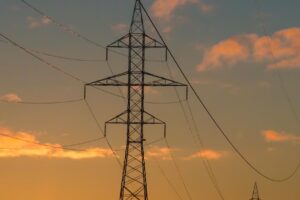
South Australian fisher Andrew Pisani has been netting South Australia’s prized King George whiting off the coast of the Yorke Peninsula for more than three decades.
But in the last 70 days he said he has not caught a single healthy fish in the waters near Stansbury, where he lives at the heel of the Peninsula.
“Every boat ramp here is empty, there’s no vessels here at all,” Mr Pisani said.
“Just dead fish.”
This week he said he was brought to tears by the sight of hundreds of dead fish in previously unaffected waters near Ardrossan at the top of the Gulf.
“It’s like something you would see in a horror movie,” he said.
“I turned to my son and said, ‘It’s all over’.”
Andrew Pisani is worried about the impact of the algal bloom if it continues through to the warmer months. (ABC News: Lincoln Rothall)
The algal bloom was first detected in South Australian waters in March.
In the Yorke Peninsula, it has decimated one of the country’s top shallow dive locations at Edithburgh, and wiped out squid, garfish and whiting populations.
Six local oyster leases were closed following the detection of toxins linked to the bloom in May.
Mr Pisani said he was concerned about what would happen if the algae hangs around until the warmer months.
“If we don’t have that tourism from October to March, that six or seven months, Yorke Peninsula will lose millions of dollars in the community,” he said.
“It’s just going to be devastating for us.”
‘It’s really quiet and really scary’
The impact of the marine disaster is already being felt in the tourism sector.
At the Port Vincent Kiosk, owner Jo Barrett said fish and chip sales are down by half as customers turn their back on local produce.
“Previously it was, ‘Do you have local? We want to buy local’,” Ms Barrett said.
“Now they don’t want local.
“They’d rather buy overseas fish and we’re not buying from our local suppliers because people don’t want it.”
Jo Barrett says her kiosk’s turnover is 40 per cent down on this time last year. (ABC News: Lincoln Rothall)
Ms Barrett said the kiosk’s turnover was 40 per cent down on this time last year.
She said she has already had to cut her staff’s rosters by at least eight hours a week, and she was worried about what would happen in the months ahead.
“It’s really quiet and really scary because we rely on our summer,” she said.
“We rely on our aquatics, which start back next week and we won’t have them, they won’t let the kids go out in the sea.”
Chris Keys says he’s concerned about the ongoing impact of the algal bloom. (ABC News: Lincoln Rothall)
Across the road, cafe owner Chris Keys has also noticed the downturn.
A dedicated early morning swimmer, lately he has been shovelling dead fish off the beach that his cafe windows look out to.
“What I worry about is the on-flow effect of the next few months,” he told a public meeting held during the week.
Members of the community have called for a natural disaster declaration to trigger Commonwealth support, and a plan of action from the state government to deal with the bloom and drive tourism back to the region.
A public meeting was held on the Yorke Peninsula during the week. (ABC News: Lincoln Rothall)
“Everything on the bottom is dead. It’s going to take more than one year to recover, it’s going to take a lot of years to recover,” a local fisherman told the meeting.
Another called for more research into the algal bloom, fish stocks and the safety of eating local seafood.
A fisheries patrol ship has been conducting underwater observations in the Gulf in the past week for the first time since the algae was detected.
The state government has previously announced commercial fishers can apply to have licence and other fees waived if their catches have been impacted by the bloom, and South Australia’s primary industries minister, Clare Scriven, has also written to her federal counterpart, seeking support for fishers.
On Friday, Federal Minister for Environment and Water, Murray Watt, said the Albanese government recognised the bloom was “very serious for South Australians”, adding that he would “certainly consider” any assistance request from the state government — and said the federal government had been “engaged with the South Australian government” for “some time”, while also saying that the bloom was occurring in state, not Commonwealth, waters.
But people in the Yorke Peninsula community that the ABC spoke to said they need information now, as businesses grapple with tough decisions about their future.
“You feel like if it was on the east coast it would have already been declared [a natural disaster],” Mark Tilbrook, the owner of Edithburgh Newsagency and Deli, said.
Mark Tilbrook believes it’s “going to get very tough” for the community. (ABC News: Lincoln Rothall)
“It’s been described as like a fire going through a national park and just destroying everything, only this is underwater.”
The small town of Edithburgh usually attracts thousands of divers, recreational fishers and surfers, but Mr Tilbrook said at the moment there was “nothing for them to see”.
“Nothing. Dead ocean.”
“It’s going to get tough I think, It’s going to get very tough for us.”
Sharks are among the marine life found washed up on the Yorke Peninsula since the algal bloom was first reported. (Supplied: Shark Watch SA)
The impacts of the algal bloom have also been felt on the Spencer Gulf.
Mussel harvesting was recently suspended at some sites in the Port Lincoln area after the detection of the same toxin that closed oyster leases at Port Vincent and Stansbury.
Oyster farmer Steven Thomson said he was confident the bloom would not reach his leases on the west coast of the Eyre Peninsula, but understood the impact it was having on others.
Coffin Bay producers experienced a much smaller outbreak of karenia mikimotoi in 2014.
Having experienced the “mental and emotional” impact of the harmful algal bloom, Mr Thomson said research into the long-term effect of karenia mikimotoi on aquaculture and native species was crucial.
“Science and government really need to be working quite closely together to work out ways of mitigating these sort of events when they do occur,” he said.
Source





